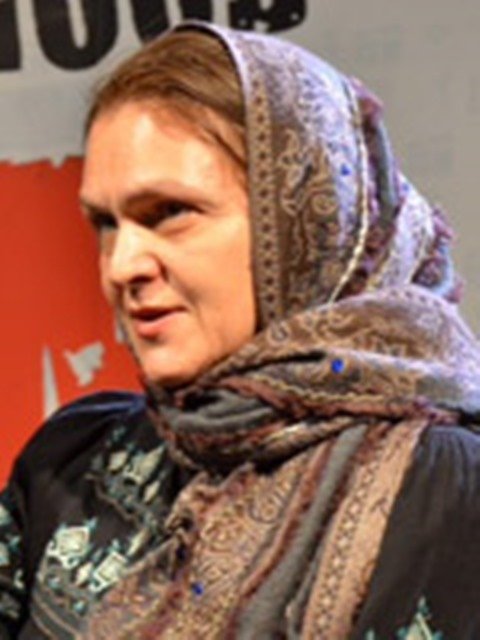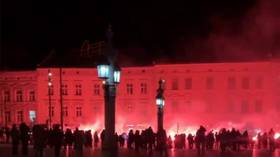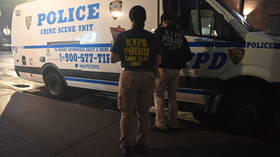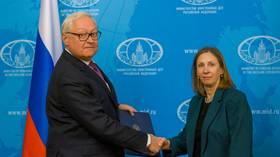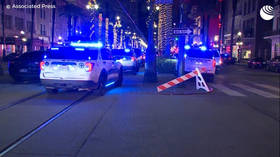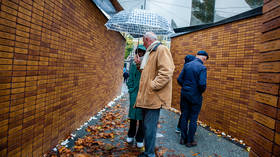Decades of defiance: Owner of Jerusalem's oldest sweets shop stands his ground in Old City
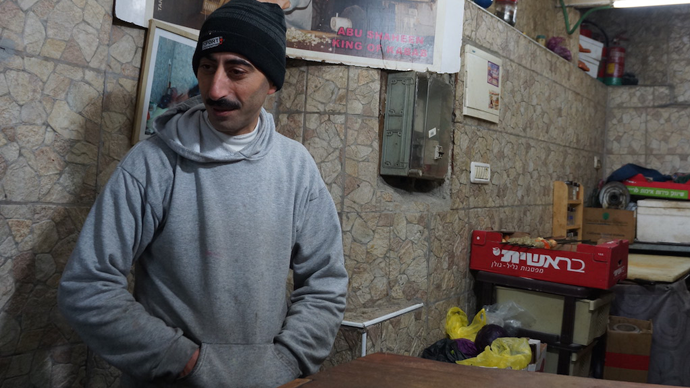
It’s hard to be a Palestinian cook in Jerusalem as de-Palestinization involves not only taking away the Palestinians’ homes, but also driving them out of all infrastructure segments. The owner of the oldest restaurant shares methods used to bring it down.
The name of the owner of the oldest candy shop and restaurant in Jerusalem is Ghazi Shaheen. He’s 40 and has six kids.
He, his family, his restaurant and his sweets are famous in the Middle East. According to the documents, his business dates back 300 years, but it started earlier than that, just without the papers that current authorities are so fond of.
The old restaurant does not look magnificent or resplendent – the design is very simple, since it’s meant for the connoisseurs and not European tourists. The pilgrims don’t come here either; to get to such true Jerusalem places one needs to know the Old City very well, be a Palestinian or be friends with Palestinians.
We are looking at old photographs, from a serene time when Palestinians couldn’t imagine that owning a restaurant would be akin to fighting outnumbered on the last line of defense.
Ghazi tells us a story about a Syrian man his father employed. Ghazi’s father, just like his father before him, taught his employees the secret family recipes, including a special way to cut meat. Eventually the man returned to Syria and they lost touch.

One day on his trip to Beirut, Ghazi went to a restaurant and started talking with the waiters. Not only did they know him for a Palestinian, they also knew his family name. It turned out that the Syrian man that worked for Ghazi’s father shared his knowledge and experience and described the famous restaurant in Jerusalem in detail. In the middle of this conversation the owner of the Beirut restaurant came in. Of course, they refused to charge Ghazi anything.
Bear in mind that nowadays few Palestinians living in Jerusalem can go abroad – there’s a high chance they won’t be allowed to return. And Palestinian refugees living in Lebanon, Syria, Iraq, Europe, the US, Canada, Russia, Ukraine and Belarus, as well as Lebanese, Syrian, Jordanian and Iraqi citizens can’t visit Jerusalem. They are simply refused entrance.
So this story is not only about the fact that strong personal ties in the Middle East that are stronger than any border. It’s also about how outside of Palestine every Palestinian from Jerusalem is seen as a hero, especially when he has such a famous restaurant.
Palestinians all over the world are connected by thousands of threads, which don’t owe their resilience to money or the support of the powerful. It might seem that all ties have been cut, all houses and shops taken away, trees and gardens cut down, wells backfilled, activists arrested, guerillas killed, but the Palestinians are still fighting, each standing his ground as well as they can.
Ghazi lives next to Al-Aqsa Mosque. He started working in the restaurant as a child. And he’s been having problems also since he was a child:
“The settlers come and turn over the tables. They especially like to do that during the Ramadan. No one doubts that police covers for them, because we’ve got CCTV cameras everywhere – it is easy to find anybody. But no one seems to ever find these settlers who make trouble.”
READ MORE: Jerusalem: Witnessing the death of Palestinian trade
“The settlers attack people, harass passers-by, they can dowse someone with water for no reason. They steal vegetables in the market. They talk dirty, they offend people with bad words.”
“The police can see it all on CCTV cameras. If they think the settlers might get into trouble they come over and take them away not to prosecute them, but to keep them safe. But no one protects the Palestinians in Jerusalem,” says Ghazi.
Palestinians in Jerusalem are without protection, they have no arms and no self-defense groups. They can only resort to a fist fight, in case of the proverbial last straw. Ghazi recalls a story:
“I had to give one of them a beating. I had sent my son to the Jewish quarter (an area in the Old City) for some bread. The settlers ganged up on him and beat him up, and when he ran they followed him. They beat him with these special wooden knuckle-dusters they carry around. And when I saw them chasing my son I had to punch one of them to stop him punching my son. He called the police. I was arrested and given 15 days of house arrest. And he walked away clean, just like all the others who took part in the beating, although it was all clear on the surveillance video tapes who attacked whom,” says Ghazi.

From the authorities’ point of view, a Palestinian is always guilty, and if he’s beating a Jew all the more so.
“We try to avoid any contact with the settlers – any at all. This state considers us as liars, while the Jews are always right,” Ghazi explains when I ask why it is that I often saw the Palestinians cordially greet each other in streets, talk to each other, and turn cold as soon as they see the settlers, and ignore them as if there were not there.
“They didn’t walk around the Old City so freely in the old days. Now they have taken over a lot of houses here. The police are at every corner to protect them. They feel completely safe and walk around any time of day or night,” says Ghazi.
Just like the majority of Palestinians, Ghazi got to know what prison is like at an early age: “During the First Intifada, they swept everyone, young and old. I was 15 at the time. They held me for three days of questioning.”
Interrogating and torturing children is a common practice in Israel. If the captured individual is really clean, they simply tie them up blindfold to a little chair with the upset balance and leave them balancing on that chair for hours, even days.If the captured individual is guilty of something – for instance, he threw stones – such interrogations can last for weeks. They can torture with electricity, very loud music, or put them in a disciplinary cell. Their purpose is to break the will of children and make them work for the secret services, spy for them, work for them. Not every child is strong enough to withstand it. They don’t allow any relatives of even lawyers to see the arrested children.
Secret services and the Army have the jurisdiction to arrest peoplenot only in Jerusalem, but also anywhere on the territory of the Palestinian Autonomy – they can break in and capture anyone there, be it a man, a woman, or a child, if they, for instance, receive a report that that person who, say, participated in a stone attack in Jerusalem, was arrested and agreed to collaborate, was now trying to evade that contract hiding with the relatives in the West Bank.
So it is very difficult for the Palestinian children to get off the hook of the secret services. But Palestinians teach their children to be strong from the cradle – that’s something that everyone needs these days.
“You see, the market is empty,” says Ghazi. There is no one else in the vicinity of his restaurant, indeed.
“Some come to do some trade for the Ramadan, but overall it’s getting worse and worse. It’s not that we reached the zero, we went subzero. There are no jobs, no trade, no money to pay any fees,” says the owner of the famous restaurant hopelessly.

“We froze our bank account in April 2014. And now I went to court – I’ve got a debt that is growing. If I fail to find a way out they can confiscate both the shop and the restaurant. Then we won’t be able to pay for the house. They’ll take the house away, even though we’ve got proper documents to the place. And we’ll get expelled from Jerusalem forever. And they’ll use our place for something else. That’s the problem every Palestinians faces in Al-Quds,” says Ghazi.
There is not a single Arab bank operating in Jerusalem. Even when some aid funds raise money for Palestinians and transfer the money, the Israeli banks can turn the transaction down, or they can freeze the account, or simply “lose” the money. And the money meant to help those in need to pay out their debts will never reach the intended recipients.
“We are trying hard, but there are no jobs,” says Ghazi with a sad smile. “The interest on our debt keeps growing. In the end, they’ll put us in jail and take everything away. Whenever people see the tax collectors, they close down – and they come every three or four days. Last week, they came on Sunday, Wednesday and Thursday.”
These words about tax collectors sound ominous in Jerusalem. Everyone who has opened the Gospels at least once is sure to remember the attitude towards such public servants during the times of Jesus Christ.It was no accident that Jesus appealed to the publicans to repent. Publicans were those long arms and hands of the state that reached out and held on tight to everyone’s throat. Paul the Apostle was a publican and then he repented being so cruel-hearted doing his job – and these days, unrepentant publicans, just like in the times of Jesus, are holding every Palestinian at tight their throats. Nothing is new under the sun in the Holy Land.
READ MORE: Hebron: Israel killed this city
“They want to close down all shops by putting all this pressure. No one is thinking of survival, we think only about out last resort, about Allah. No one else can save us. We are praying for peace. We hope to live peacefully and live well. But as you can see it is all going the other way,” says Ghazi.
“The settlers have a plan – to build homes on top of our shops and restaurants. They won’t let us work, controlling everything from the top. There are already settlements like that,” says Ghazi.
Indeed, if you climb the market’s roof you will see a sizable Jewish settlement there.
“They already have plans for three markets in the Old City. It’s a complicated system they developed. They also have plans for the Eastern Jerusalem, beyond the Old City,” explains Ghazi.
“As long as we are here, we are afraid of no one. We are not against anyone, but we are against the occupation. If Jews want to live everywhere without any problems they are welcome to live as friends, not as occupants,” says Ghazi.
“We will be the bone in their throat, they will choke on us. That’s how our grandfathers used to say,” says Ghazi as he takes me to see his restaurant. It’s a very modest place with plastic chairs and cheap clean tablecloths. On the walls, there are portraits of his father and grandfather, and a copy of the title to the house in a frame.
We say good-bye. Who knows if I will see him in Jerusalem when I come here again – the smiling man from the family of keepers of the culinary secrets praised throughout the Middle East – or will I see the Israeli flag over this house, the way it’s happened to other houses of the Old City taken over by the settlers?
The statements, views and opinions expressed in this column are solely those of the author and do not necessarily represent those of RT.
The statements, views and opinions expressed in this column are solely those of the author and do not necessarily represent those of RT.
